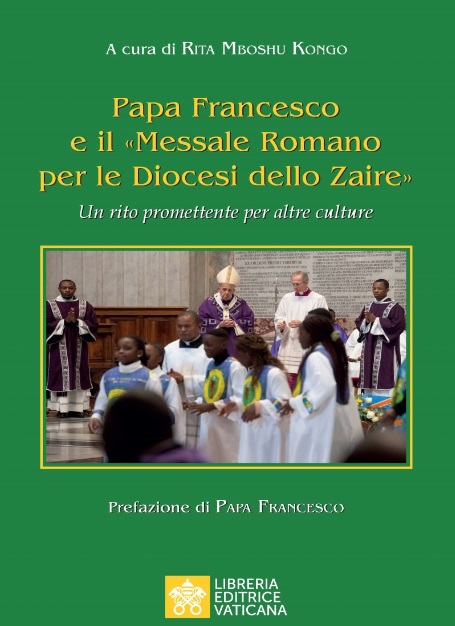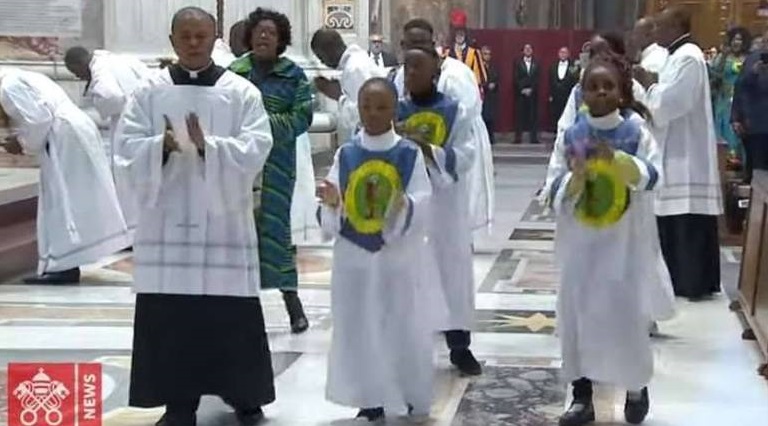The "Congolese Rite" as a preparation for an "Amazonian Rite" for the introduction of progressive innovations in Germany?
(Rome) The Vatican publishing house Libreria Editrice Vaticana (LEV) published the book "Pope Francis and the Roman Missal for the Dioceses of Zaire." A step on the way to the Amazon rite? Yes, says VaticanNews, the news portal of the Vatican.
The book was published exactly one year after a “ Holy Mass for the Congolese Community,” which Pope Francis celebrated on December 1, 2019 in St. Peter's Basilica. At that time, the question was asked why the Pope used Italian in Holy Mass for bishops, priests and believers in the Congo, where French and Bantu languages are spoken, where the common Church language Latin is offered.
The foreword to the book comes from Pope Francis. Its subtitle suggests that it is about more than just the Congo:
"A promising rite for other cultures."
VaticanNews, the news portal of the Holy See, which provides interpretation to book: The Roman Missal for the Dioceses of Zaire is in direct connection with the so-called "Amazonian Rite" or Amazon Rite, which was all the rage in the last year of the Amazon Synod. The German section VaticanNews chose this as a headline:

"Pope Francis: For a stronger inculturation of the liturgy."
The Spanish section subtitled , however:
"Pope: The Zairean Rite a 'Promising Path' for an Amazonian Rite."
The Holy See refers to the country as Zaire, although this name, which was only in use for a short time anyway, was dropped as early as 1997. The Kingdom of the Congo dates back to the late 14th century. Nzinga a Nkuwu, the fifth Manikongo, as the king was called, was baptized by Portuguese missionaries in 1491. As João I, he became the first Christian king of the Congo and initiated the Christianization of the country. The country was internally shattered by internal power struggles and the slave trade. From 1877 it began to be divided among the European colonial powers. The lion's share was secured by the Belgian King Leopold I, the smaller part by the French Republic. To Portugal, the discoverer of the country,only a small stretch of coast remained. The Belgian Congo (from 1908), which comprised 87 percent of the Congo and is almost as large as Western, Central and Southern Europe combined, became in the course of decolonization in 1960, the Federal Republic of the Congo and in 1964 the Democratic Republic of Congo. This was in 1971 under the dictator Mobutu "Africanized' to Zaire, but again in 1997 it returned to DRC.
The Congo Basin was already mentioned in the course of preparations for the Amazon Synod was as a possible expansion zone for the Synod results. In his foreword and the video message circulated yesterday, Pope Francis speaks out in favor of a “stronger inculturation of the liturgy”. The head of the Church praised the Congolese Rite and promoted its own "Amazon rite".
Francis had already added the Synodal propoal in his Post-Synodal Letter Querida Amazonia.
In an analysis of Querida Amazonia wrote the Chilean lawyer José Antonio Ureta, founder of Right to Life and Civil Rights Organization Fundación Rome and a member of the international movement Tradition, Family and Private Property (TFP):
“A separate 'Amazonian Rite' was proposed at the synod. That is reason enough to remain vigilant, especially since the author of the document is known to be cunning."
So Ureta said Pope Francis, revolutionizing the Church teaching on marriage in his post-synodal letter Amoris laetitia had packed in a footnote. Also Querida Amazonia contains such a footnote No. 120 where Francis succinctly mentioned.:
"At the synod a separate 'Amazonian Rite' was proposed."

Such vague formulations offer a lot of leeway, as Francis loves it.
VaticanNews trying to steer with his articles the attention and thinking, referred in the context of the new book that is from the Congo, but the Amazon said, but did not mention that the Amazon is in reality just a cipher for Germany.
Right from the start, the Amazon Synod was backed by ultra-progressive groups in the German-speaking area, from Erwin Kräutler to Fritz Lobinger to Paul Suess. The detour via the Amazon was the only reason taken targeted for some more since the Second Vatican Council, which points to realize the progressive agenda. On July 4, 2019 a few months before the Amazon Synod, Austria's bishops declared: What will be decided in the distant Amazon will also be implemented in Austria. It sounds like a gamble where a blank check is signed. In fact, the trend-setting hierarchs of the German-speaking world and the surrounding district were so well informed about what was going to happen from the Amazon and during the Synod in Rome thousands of kilometers away, because the Amazon agenda in reality is a German agenda.
The "Congolese Rite" or "Zaire Rite" is a building block along the waterway that allows the Congo to flow into the Amazon and the Amazon into the Rhine and Danube.
Text: Giuseppe Nardi
Bild: Vatican.va/LEV (Screenshots)
Trans: Tancred vekron99@hotmail.com
AMDG


Tancred,
ReplyDeleteThe link to video is not working (it's not visible at all).
Ivan
Ivan, try it on desktop view.
ReplyDeleteThis reminds me of a "mass" I almost went to when I was in college. The priests who ran the university were/are very liberal- but it was at a neighboring parish that I witnessed the most shocking "mass" spectacle of my life.
ReplyDeleteThe "mass" was in the "Community Room" in the basement of the rectory. The congregation was composed of about 25 people. The priest was about 60, but he had long grey hair down to his shoulders. He sat on the floor cross legged, in jeans and a white shirt with a stole . Form opening to the part I left at, it was all ad libbed. The host was a big tomato and cheese pizza, the "wine" was beer. When I saw the priest raise up the pizza on a glass plate and say " I bless this bread, loving this wine".....I got up and left.
It was supposed to be ab experimental "youth Mass", just like this Zairean "mass" was experimental, and now probably approved. I can just imaging what a circus it is, and all the others will be.
Damian M. Malliapalli